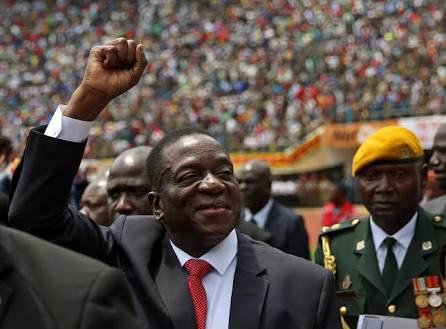Zimbabwe President, Emmerson Mnangagwa, promised on Friday that elections would be held in 2018 as scheduled and outlined a broad vision for restoring economic and financial stability.
He said this in his maiden speech as Zimbabwe’s new president.
Mnangagwa, known as “The Crocodile,” takes the helm from the nation’s leader of 37 years, Robert Mugabe, 93, whose rule saw the economy collapse.
Mugabe stepped down on Tuesday after a bloodless coup that drained away almost all of his support.
Mnangagwa, 75, is Mugabe’s former deputy and long-time comrade. He had long been tipped as Mugabe’s replacement.
However, he was accused of “disloyalty” and sacked earlier this month after he came into conflict with Mugabe’s ambitious wife, Grace, who also wished to take over from her increasingly doddery husband.
But the sacking is now widely seen as a tactical error on Mugabe’s part, as Mnangagwa had the backing of the military, which prompted the mid-November move to sideline Mugabe.
In his speech, the new leader lavished praise on his predecessor.
“Let us all accept and acknowledge his immense contribution … to me, personally, he remains a father, mentor, comrade in arms and my leader,” he said.
He asked for “bygones to be bygones” and said he was committed to Zimbabweans regardless of race or tribe.
But he devoted much of his speech to his goals of stabilising the troubled Zimbabwean economy.
“The bottom line is an economy that’s back on its feet,” he said, promising job creation and urging the return of foreign investors.
The new leader also vowed to stamp out corruption, saying “when these occur swift justice must be served”.
“Real solutions must be generated as a matter of urgency … people must be able to access their earnings and their savings as and when they need them,” he continued to great applause.
Mnangagwa also promised compensation to farmers, who had lost their property to land reform programmes and urged the Zimbabwean diaspora overseas to return and help rebuild the country.
He acknowledged the great hopes placed on him as Mugabe’s successor and said “our domestic politics has become poisoned and polarising … we dare not squander the moment.”
There was much fanfare in the packed stadium where the inauguration ceremony took place, with heads of state from neighbouring countries including Mozambique, Zambia and Botswana in attendance.
South Africa’s Jacob Zuma was absent due to a conflicting event.
Mnangagwa, adorned with military medals, looked pleased as the pomp and ceremony played out, with a brass band providing entertainment.
Popular Zimbabwean singer Jah Prayzah also performed.
Gen. Constantino Chiwenga, who led the military takeover, and other members of the armed forces swore allegiance to the new president.
Morgan Tsvangirai, the leader of the main opposition Movement for Democratic Change (MDC), was among the dignitaries at the ceremony.
The MDC struggled peacefully against Mugabe at the ballot box for years, but was violently quashed.
Several MDC officials have expressed concern in the last few days that Mnangagwa will continue to sideline them as Mugabe has done.
Mnangagwa will be interim president until Zimbabwe holds elections next year.
He confirmed elections will be conducted next year.
“I implore you all to declare that never again … should the circumstances that have put Zimbabwe in an insufferable position be allowed to recur,” he said.
Zimbabweans have widely supported the military takeover as Mugabe, once a hero of the liberation struggle, had grown unpopular for alleged human rights abuses and economic malaise.
However, some analysts worry the Mnangagwa might be more of the same as he hails from the ruling party establishment.
He has also been linked to such as the 1980s massacre of Zimbabwe’s Ndebele, though he has denied the charges.

